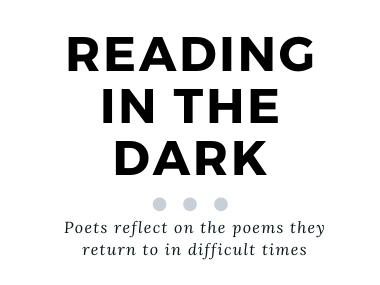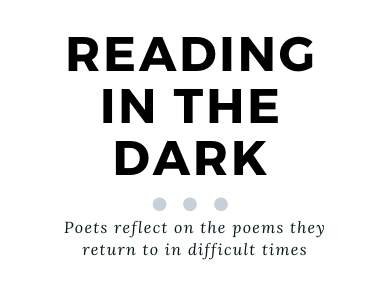Reading in the Dark
Joy Harjo on N. Scott Momaday’s “The Delight Song of Tsoai-talee”

The Delight Song of Tsoai-talee
I am a feather on the bright sky
I am the blue horse that runs in the plain
I am the fish that rolls, shining, in the water
I am the shadow that follows a child
I am the evening light, the lustre of meadows
I am an eagle playing with the wind
I am a cluster of bright beads
I am the farthest star
I am the cold of dawn
I am the roaring of the rain
I am the glitter on the crust of the snow
I am the long track of the moon in a lake
I am a flame of four colors
I am a deer standing away in the dusk
I am a field of sumac and the pomme blanche
I am an angle of geese in the winter sky
I am the hunger of a young wolf
I am the whole dream of these things
You see, I am alive, I am alive
I stand in good relation to the earth
I stand in good relation to the gods
I stand in good relation to all that is beautiful
I stand in good relation to the daughter of Tsen-tainte
You see, I am alive, I am alive
N. Scott Momaday, “The Delight Song of Tsoai-talee” from In the Presence of the Sun: Stories and Poems, 1961-1991. Copyright by N. Scott Momaday. Reprinted with the permission of University of New Mexico Press.
In response to the Coronavirus pandemic, we asked poets to write about the poems they return to in difficult times—to find solace, perspective, or even a moment of delight. Subscribe to the PSA newsletter for more Reading In The Dark responses and to keep updated with the PSA.
Though I loved poetry all of my life, it wasn’t until poems like “The Delight Song of Tsoai-talee” by N. Scott Momaday that I turned to the making of poetry. Both Momaday and I came to poetry as artists. And both of us have a love of those traditional rituals that place the speaker/singer into an intimate relationship with a place on earth, a people. The form of the poems suggests Walt Whitman as a forbear. Did Walt Whitman’s involvement with Native cultures inspire him to open up the arms of poetry to the notion of making lines like leaves of grass, like the winds rippling through the green, to praise how we are all gathering up on this earth under an immense sky? Every poem establishes itself in a kind of “I am” assertion, that is, a poems says: “I am the voice of the poet or what is moving through time, place, and event, I am sound sense and words, I am made of all this, and I don’t know where I am going but I will show you,” though most don’t directly declare it. Momaday’s poem establishes that we are everything, that we are related to all life, all beings. And in this assertion, as we stand at the center of the circle that the poem has established with words and images, we are in good relation, and alive. In this time of a virus roaming methodically across the earth, infecting the earth’s population, this poem centers us in the natural world, and declares a healing. I imagine the voice of Earth speaking the first stanza. The Earth, all beings, are wired toward healing. This poem reminds us. I believe every poem is ritual: there is a naming, a beginning, a revelation, and then closure, which can be opening, setting the reader, speaker or singer out on a journey.
—Joy Harjo
Joy Harjo is an internationally renowned performer and writer of the Muscogee (Creek) Nation. She is the author of several poetry collections, plays, and children's books. She was named the 23rd Poet Laureate of the United States in 2019.

